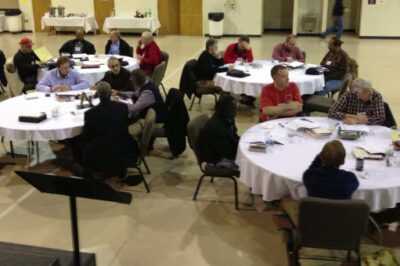Picture a typical men’s ministry at a typical church. If we were to make a list of activities men would be doing over the next several months, what would make the list? Perhaps it would be men’s small groups, a weekly Bible study or monthly breakfast, a service project, a mission trip, sports, maybe a retreat.
Now, think about the responsibilities and tasks that committed men will be doing at your church in the next week that are not part of the list above. They’ll be doing things like teaching adult classes, leading small groups for couples/families, singing in the choir or praise team, playing musical instruments, working with audio/visual equipment, coaching sports teams, doing maintenance work around the church, serving in the nursery, caring for the poor and needy, teaching elementary boys, leading a boy scout troop, working with the youth group, visiting the area assisted living home, and on and on.
Does it really make sense to promote a “men’s ministry” that excludes all of this incredible ministry being done by men in your church? We don’t think so.
We suggest you kill the term “men’s ministry” and instead start talking about an all-inclusive ministry to men.
The two overriding principles of an all-inclusive men’s ministry are:
1. God has called you to disciple every willing man in your church and community, not just those who are currently coming to your men’s only events. An all-inclusive men’s ministry includes strategies for discipling all your men, however they choose to connect with your church.
2. Everything that any man does with your church is ministry to men. An all-inclusive ministry to men tries to maximize the kingdom impact of every interaction with every man, no matter the setting.
This concept really crystallized when a church I worked with during a consulting weekend shared with me one of their “problems:” lots of young fathers in the community were being reached through their family sports program, getting involved in marriage and children’s events, going through leadership training, and serving in leadership positions in the church–all without ever being involved in their “men’s ministry.” Together we were able to see that this wasn’t a problem at all; they just needed to expand their vision of what a ministry to men was all about.
One great advantage of an all-inclusive ministry to men is that it helps every man feel like they’re a part of what God is doing through the men of the church. When you begin to celebrate all the ways that men are connected and serving you will have a new unity and momentum among your men.
For instance, one church calls their ministry Iron Men. To help every man feel a part of what God is doing, they always refer to the men of the church as Iron Men. If you go to church there—even for one week—you are an Iron Man. Almost every time there is an announcement to the men, whether it is in service or elsewhere, the statement is made, “Every man in our church is an Iron Man.”
An all-inclusive ministry mindset transforms how you think about success in your ministry to men. It’s natural for men’s leaders to think of success in terms of how many men are involved in certain activities and the impact on their lives. So a leader desperately wants men to come to the weekly breakfast, or the annual retreat, or participate in the service project. Of course these are all good things, but measuring them may not have anything to do with how effective your church is with men.
The only true measure of success in ministry to men is this: Is our church producing mature male disciples? If the answer to that question is yes, then you have an effective ministry to men, even if you don’t do a single “men’s only” activity or even if nobody comes to the ones you do. Don’t be mad at them for not coming. Instead, ask the next question “How are we producing disciples?” Now quit your ineffective men’s activity and invest in the things God is using in men’s lives.
The role of a leadership team in an all-inclusive ministry to men is to pour your support and resources into the efforts that are producing these disciples, even if they are co-ed or run by different “ministries” in the church. Of course every church will likely need some “men’s only” activities, but these serve the larger process and are not an end in themselves.
So how do you get started with an all-inclusive ministry to men?
One great way to get started is to think about the two or three most significant ministry efforts your church will undertake in the next year. Perhaps you do a big community outreach at Thanksgiving, a large Christmas musical, a new member weekend four times a year, a big family day in the spring, or a summer kid’s camp for the children in the community.
Whatever the two or three items are that make the list, these are likely also some of the best opportunities your church has for ministry to men. Let me give you examples from actual churches.
- One church’s men’s leadership team realized that the night of Vacation Bible School when the children sang for their parents was perhaps their best men’s outreach opportunity of the entire year. This children’s ministry event provided them with 30 or 40 unchurched men—yet they had never intentionally connected with them because it was not “men’s ministry.”
When they realized their error, they built a plan to meet these dads and offer them a next step. Because they had a golf outing coming up several weeks after the VBS, they set up a putting green outside the worship center so the kids and dads could be part of a contest. Then they connected with the men and gave them information about the upcoming golf outing.
- One church realized they had never done anything to connect with the 50 or more unchurched men who sent their kids to the church’s preschool. They made plans to get with the school director and plan a father/child day with games and prizes so they could meet these men and give them some next steps.
- A church wanted to build more male leaders, so they were thinking about implementing a leadership curriculum for men. When we talked about where their current male leaders were being raised up, they identified a ministry that formed serving teams to meet needs in the community. Rather than try to establish a new ministry, they decided to get more men connected to the ministry that was already working.
- Another church has a major family festival for their community in the fall with thousands of attendees. The men’s leadership team realized there were hundreds of unchurched men who came with their families. They brainstormed ideas to set up a “ring the bell with a sledgehammer” game to meet these men and offer them opportunities to connect.
- A church of 600 people had over 700 men participate in their recreation ministry, but the men’s leaders had never considered how to leverage these connections because it was part of another ministry team. They worked with the head of the recreation team to identify the best opportunities to connect with these men.
- Finally, a church did a live nativity for their community that had thousands of families walk through. The men’s leadership team realized this would be a great opportunity to connect with some unchurched dads. They brainstormed ways to offer dads a special gift so they could connect with them at the event.
What about your church? Choose one or two opportunities to get behind so you can start building an all-inclusive ministry to men. How could you leverage your major ministry initiatives next year to make them even more effective with men?
That’s just the first step. Next, you need to get some leaders together, then talk and pray about how God might make all your church’s efforts work together to help men become passionate disciples of Jesus Christ. You’ll want to build a seamless process for men using all the ministry activities of your church.
Want to learn more about an all-inclusive ministry to men?
1. Search our website for the phrase “all-inclusive” (or click here).
2. Read the book, No Man Left Behind.
3. Get the No Man Left Behind training.
4. Call a ministry consultant at 407-472-2100. We’d love to talk with you and your team about what this could look like in your church.
David Delk is president of Man in the Mirror. He is the author or co-author of five books, including The Marriage Prayer, The Dad in the Mirror, and No Man Left Behind.







Leave a Comment
You must be logged in to post a comment.